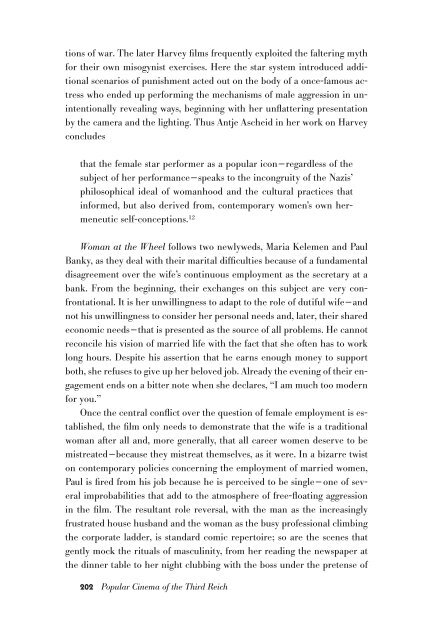- Page 2 and 3:
POPULAR CINEMA OF THE THIRD REICH
- Page 4 and 5:
SABINE HAKE Popular Cinema of the T
- Page 6 and 7:
CONTENTS Preface vii 1. Popular Cin
- Page 8 and 9:
PREFACE Why another study on the ci
- Page 10 and 11:
elements in the productive encounte
- Page 12 and 13:
culture and between the public and
- Page 14 and 15:
national cinema into international
- Page 16 and 17:
Mary-Beth O’Brien, Stephen Brockm
- Page 18 and 19:
popular genres and styles, the favo
- Page 20 and 21:
lemished by the times in which it w
- Page 22 and 23:
could pretend that fascist ideology
- Page 24 and 25:
tion that, “Instead of determinin
- Page 26 and 27:
codes, and the heavy loans from bou
- Page 28 and 29:
separated from the almost programma
- Page 30 and 31:
definition of popular cinema can th
- Page 32 and 33:
fused with, folk culture, which is
- Page 34 and 35:
tion of the spectator in the realiz
- Page 36 and 37:
mestic industry and its need for pr
- Page 38 and 39:
Hence its audience was constantly a
- Page 40 and 41:
the German cinema, a sensibility th
- Page 42 and 43:
tained cinema after 1933 and provid
- Page 44 and 45:
director or producer could continue
- Page 46 and 47:
the musicality of his direction in
- Page 48 and 49:
1. Das häßliche Mädchen (1933, T
- Page 50 and 51:
However, at no point does she enter
- Page 52 and 53:
Lotte rehired, this time as the dir
- Page 54 and 55:
subsequent efforts at adaptation an
- Page 56 and 57:
2. Viktor und Viktoria (1933, Victo
- Page 58 and 59:
the spectator to partake in the ill
- Page 60 and 61:
early slapstick comedies of Lubitsc
- Page 62 and 63:
3 CINEMA, SET DESIGN, AND THE DOMES
- Page 64 and 65:
sensual and emotional excess. The r
- Page 66 and 67:
cism first presented by Walter Benj
- Page 68 and 69:
spaces to the largely decorative fu
- Page 70 and 71:
worked on numerous Paul Martin come
- Page 72 and 73:
of surface phenomena. In their view
- Page 74 and 75:
liner in Allotria (Tomfoolery, 1936
- Page 76 and 77:
young sculptor in Weimar Berlin who
- Page 78 and 79:
terity. The two love stories that I
- Page 80 and 81:
Berlin Building Exhibitions. The pi
- Page 82 and 83:
several light-colored carpets with
- Page 84 and 85:
4AT THE MOVIES FILM AUDIENCES AND T
- Page 86 and 87:
material, must we conclude that, to
- Page 88 and 89:
Efforts to attract more regulars in
- Page 90 and 91:
practice of “locked doors” (i.e
- Page 92 and 93:
from the perspective of those group
- Page 94 and 95:
In the absence of any measurable re
- Page 96 and 97:
gional differences would eventually
- Page 98 and 99:
ures, Walter Panofsky distinguished
- Page 100 and 101:
women and cinema—reason enough fo
- Page 102 and 103:
produced by sociological studies, s
- Page 104 and 105:
the form of romantic comedies, film
- Page 106 and 107:
man,” is clearly recognizable as
- Page 108 and 109:
Lowry has relied on such opposition
- Page 110 and 111:
some of Harold Lloyd, Edith Hamann
- Page 112 and 113:
1933 as an ongoing reflection on th
- Page 114 and 115:
ity projected by one of the leading
- Page 116 and 117:
figurations—but less through his
- Page 118 and 119:
7. Heinz Rühmann, Terra Advertisem
- Page 120 and 121:
sence of man. His performance encou
- Page 122 and 123:
To conclude: As the prototype of th
- Page 124 and 125:
Sirk continues to feature prominent
- Page 126 and 127:
duction and reception. At the same
- Page 128 and 129:
Delineating the formative influence
- Page 130 and 131:
Garvenberg (Willy Birgel) and his b
- Page 132 and 133:
aerial shots of Berlin’s historic
- Page 134 and 135:
sical encoding of otherness. As an
- Page 136 and 137:
seek the spiritual rewards availabl
- Page 138 and 139:
the articulation, however compromis
- Page 140 and 141:
dominant ideology, Linda Schulte-Sa
- Page 142 and 143:
unhealthy need for self-discovery,
- Page 144 and 145:
7 THE FOREIGN AND THE FAMILIAR ON G
- Page 146 and 147:
The myth of the Hollywood dream fac
- Page 148 and 149:
office hits. Paramount’s reputati
- Page 150 and 151:
Less frequently, Hollywood became i
- Page 152 and 153:
motion-picture theaters, including
- Page 154 and 155:
MGM maintained their Berlin offices
- Page 156 and 157:
and often marred by insufficient ti
- Page 158 and 159:
They included the Seventy-ninth Str
- Page 160 and 161:
and they included American Nazi sym
- Page 162 and 163:
newsreel Sieg im Westen (Victory in
- Page 164 and 165:
of Hollywood films—and, in so doi
- Page 166 and 167:
sion policies, and, of greatest rel
- Page 168 and 169: a clear sense of national identity.
- Page 170 and 171: and had contributed significantly t
- Page 172 and 173: panion piece, Café Electric (1927)
- Page 174 and 175: yond local and national differences
- Page 176 and 177: 10. Wiener Blut (1942, Viennese Blo
- Page 178 and 179: too, becomes associated with “fem
- Page 180 and 181: 11. Operette (1940, Operetta), Adve
- Page 182 and 183: Ringtheater intensify after her fir
- Page 184 and 185: the so-called Überläuferfilme. Co
- Page 186 and 187: drop of an artificial Vienna re-cre
- Page 188 and 189: 9THE POWER OF THOUGHT REDEFINING PO
- Page 190 and 191: ciliation—for other mass cultural
- Page 192 and 193: film journalists and scholars over
- Page 194 and 195: And these, in turn, were determined
- Page 196 and 197: ative subjectivity, film art achiev
- Page 198 and 199: debates because of their greater ab
- Page 200 and 201: entertainment. Such thinking propel
- Page 202 and 203: era’s point of view find a place,
- Page 204 and 205: of the racial community in resolvin
- Page 206 and 207: ception of mise-en-scène. In the s
- Page 208 and 209: equally noticeable shift from senti
- Page 210 and 211: the following thematic overview and
- Page 212 and 213: play rather than a didactic device
- Page 214 and 215: The disciplining force behind these
- Page 216 and 217: prosecutor who neglects her husband
- Page 220 and 221: tender impulses that hitherto susta
- Page 222 and 223: 14. Unser Fräulein Doktor (1940, O
- Page 224 and 225: ing sexuality. As a woman, Elisabet
- Page 226 and 227: 11 THE LEGACIES OF THE PAST IN THE
- Page 228 and 229: logical innovations, artistic movem
- Page 230 and 231: screenplay about the pervasiveness
- Page 232 and 233: the theater director cancels a Zuck
- Page 234 and 235: ole in the rebuilding of the German
- Page 236 and 237: the privileges of traditional mascu
- Page 238 and 239: trauma, it might be argued, found e
- Page 240 and 241: joint appearance in the Viktor Tour
- Page 242 and 243: transformation of a figure of moral
- Page 244 and 245: of the eponymous 1924 film by F. W.
- Page 246 and 247: come—its own past played a key ro
- Page 248 and 249: equally problematic use of “featu
- Page 250 and 251: Genrefilm in der Weimarer Republik
- Page 252 and 253: 21. Based on detailed analysis prov
- Page 254 and 255: und Film-Bauten (Reinbek: Rowohlt,
- Page 256 and 257: ledge & Kegan Paul, 1982), pp. 77-9
- Page 258 and 259: 33. Anon., “Das ungelöste Rätse
- Page 260 and 261: Langemarck to Verdun” (pp. 45-76)
- Page 262 and 263: Berlin and the conference organized
- Page 264 and 265: Press, 1991), p. 274. Even someone
- Page 266 and 267: 1936. For the few articles dealing
- Page 268 and 269:
press, see “Jüdischer USA.-Kampf
- Page 270 and 271:
21. Hugo Jury, quoted by Oliver Rat
- Page 272 and 273:
The book is based on “Das Gesetz
- Page 274 and 275:
Third Reich, see Klaus Vondung, Vö
- Page 276 and 277:
and Ursula Bessen, Trümmer und Tr
- Page 278 and 279:
Jens Schumann, Hans Albers: Seine F
- Page 280 and 281:
Hull, David Stewart. 1969. Film in
- Page 282 and 283:
THIS PAGE INTENTIONALLY LEFT BLANK
- Page 284 and 285:
Eggebrecht, Axel, 3 Eggerth, Marta,
- Page 286 and 287:
Liebelei (1933), 29, 155 Liebeneine
- Page 288:
Weiss Ferdl, 143 weiße Hölle vom

















